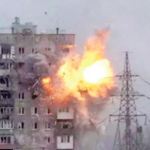What if the USSR continued to exist? First, in A.D. 2023 it would not be the same USSR as in A.D. 1989, still less so as in A.D. 1960 or earlier. Everything evolves, so would the USSR and it would have continued to evolve, to change. Consider China, for that matter. The Soviet Union would have been capitalist in all but name with a strong say on the part of the government and the communist(?) party. Since Gorbachev, we would not have had simpletons as leaders like Nikita Khrushchev in the Kremlin. Rather, refined individuals like the said Gorbachev or present-day Putin: i.e. educated men with good manners.
Having said which, let us think about the world A.D. 2023 with the still existing USSR. What would have happened between 1991 (the year of the dissolution of the Soviet Union) and 2023? or – still better, still more relevant – what would not have happened between 1991 and 2023?
1 The Warsaw Pact would have continued to exist, which by itself and in itself means that NATO would not have expanded to central and eastern Europe; which in turn means that no conflict would have been in the making as we can observe it today.
2 Yugoslavia would have continued to exist, and even if it had somehow disintegrated, then peacefully. Certainly, there would have been no bombing of Yugoslavia by West, no civil war, no show trials in the Hague, no murdering of Slobodan Milošević in prison.
3 There would have been no wars in Chechnya: thousands of lives would have been saved.
4 No worldwide covid-occasioned freezing of the world activities would have been feasible. Most probably, the powers that be – those who prepared the covid dress rehearsal (before who knows what?) – would not have even considered imposing that ill-famed worldwide curfew with all others attendant restrictions.
5 All central European countries would still have been part of the “European Union of the East” i.e. the Comecon. The Western European union would not have expanded to the east.
6 Most remarkable: Ukraine would have remained the second most important republic of the Soviet Union. As such:
[a] in 2023, it would have approximately 50 million inhabitants as opposed to the estimated 25 or so million at present;
[b] it would have been highly industrialized; no need for people to flood Europe in search of employment;
[c] 400 thousand Ukrainian men would not have been killed, tens of thousands would not have been maimed or become amputees;
[d] Ukrainian cites, towns and villages would have remained unscathed;
[e] the Ukrainian Soviet Socialist Republic would still possess the Donbass and Crimea.
7 The Baltic States would not have been depopulated as they are now.
8 The managers of the world in the West would not have dropped their masks and would not have:
[a] accelerated the ethnic replacement; and
[b] enforced homosexuality on people at large.
Why? Because during the existence of the Soviet Union both sides tried to convince their own societies and the societies in the opposite political bloc that their system was better, more attractive, more humane. Surely, the open propaganda of homosexuality with all attendant phenomena like encouraging teenagers to take hormone blockers or change their biological sex would have been moderated or even deactivated; surely, the Western managers of the world would not have wanted to show to the central Europeans and the citizens of the Soviet Union how much they despise their own Western nations and how much they want to replace them with aliens.
9 Muammar Qaddafi would not have been toppled; no influx to Europe of people from Africa would have occurred.
10 Most probably Germany would not have been re-united. The existence of East Germany would have influenced the policy-making of Western Germany; since by 2023 travel restrictions would certainly have been loosened, Western Germans might have been able to move to East Germany in an attempt to flee the homosexual propaganda and the ethnic replacement if these had been executed as they are today. Notice that Alternative for Germany is especially popular in the former German Democratic Republic. How much more would it have been popular if that republic had persisted?
11 The Comecon (the eastern version of the EEC or the European Economic Community, the predecessor to the European Union) would have evolved into a rivalry counterpart of the EEC (a miniature of today’s BRICS?), which would have been a healthy phenomenon: rather than having a monopolist as regards the economic, political and societal model, we would now have two European models of civilizational development, vying with each other and not letting each other degenerate into something that we can now see in the European Union.
What do you say to all of the above? True or false? Notice how many lives would have been saved in Yugoslavia and Ukraine. Notice how many able-bodied men would have served their respective countries with their hands and brains rather than with their corpses. Notice the continued immutability of state borders that we would have had up to now and the resultant peace. Correct me if I’m wrong.

















